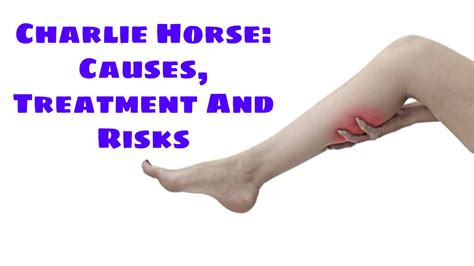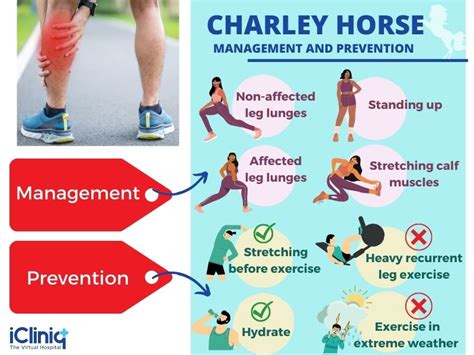Intro
Learn about Charlie Horse during pregnancy, including causes, symptoms, and relief methods, to manage leg cramps, muscle spasms, and discomfort safely.
Pregnancy is a unique and exciting time in a woman's life, filled with numerous physical and emotional changes. As the body adapts to support the growing fetus, it's not uncommon for women to experience a range of symptoms, from morning sickness to back pain. One lesser-known but relatively common issue that can occur during pregnancy is the Charlie horse, also known as a muscle cramp or spasm. These sudden, intense contractions can be uncomfortable and even painful, leaving many women wondering what causes them and how to alleviate the discomfort.
As the pregnancy progresses, the body undergoes significant changes, including shifts in blood flow, hormone levels, and mineral balances. These changes can affect muscle function and nerve communication, leading to an increased risk of muscle cramps. Additionally, the growing uterus can put pressure on nearby nerves, causing them to become irritated and trigger muscle spasms. While Charlie horses can be a nuisance, they are generally not a cause for concern and can be managed with some simple techniques and lifestyle adjustments.
Despite their relatively harmless nature, Charlie horses during pregnancy can be a source of anxiety and discomfort for many women. The sudden, intense pain can be alarming, especially if it occurs at night and disrupts sleep. Furthermore, the uncertainty surrounding the causes and treatment of Charlie horses can leave women feeling frustrated and unsure of how to manage their symptoms. By understanding the underlying factors that contribute to Charlie horses during pregnancy and exploring effective strategies for prevention and relief, women can better navigate this common issue and enjoy a healthier, more comfortable pregnancy.
Understanding Charlie Horses During Pregnancy

Charlie horses, also known as muscle cramps or spasms, are sudden, involuntary contractions of the muscles. During pregnancy, these cramps can occur in various parts of the body, including the legs, feet, and abdomen. While the exact causes of Charlie horses during pregnancy are not fully understood, several factors are thought to contribute to their development. These include changes in blood flow and circulation, hormonal fluctuations, and mineral imbalances, particularly in magnesium and calcium. Additionally, the growing uterus can put pressure on nearby nerves, leading to muscle irritation and spasms.
Causes of Charlie Horses During Pregnancy
The causes of Charlie horses during pregnancy are multifaceted and can vary from woman to woman. Some of the most common contributing factors include: * Changes in blood flow and circulation: As the pregnancy progresses, blood flow increases to support the growing fetus. This can lead to changes in circulation, which may contribute to muscle cramps. * Hormonal fluctuations: Hormonal changes during pregnancy can affect muscle function and nerve communication, increasing the risk of muscle cramps. * Mineral imbalances: Low levels of magnesium and calcium can contribute to muscle cramps, as these minerals play a crucial role in muscle function and relaxation. * Nerve pressure: The growing uterus can put pressure on nearby nerves, leading to muscle irritation and spasms.Prevention and Relief Strategies

While Charlie horses during pregnancy can be uncomfortable, there are several strategies that can help prevent and alleviate them. Some of the most effective techniques include:
- Stretching and exercise: Regular stretching and exercise can help improve circulation, reduce muscle tension, and prevent cramps.
- Magnesium and calcium supplements: Taking magnesium and calcium supplements can help maintain healthy mineral levels and reduce the risk of muscle cramps.
- Hydration: Drinking plenty of water can help maintain healthy circulation and prevent dehydration, which can contribute to muscle cramps.
- Rest and relaxation: Getting plenty of rest and engaging in relaxation techniques, such as deep breathing and meditation, can help reduce stress and alleviate muscle tension.
Stretching Exercises for Charlie Horse Relief
Stretching exercises can be an effective way to alleviate Charlie horse discomfort and prevent future episodes. Some of the most beneficial stretches include: * Calf stretch: Stand facing a wall with one hand on the wall for balance. Step one foot back about a foot and a half, keeping your heel on the ground. Slowly bend the front knee, keeping the back leg straight, until you feel a stretch in your calf. * Hamstring stretch: Sit on the floor with your legs straight out in front of you. Lean forward, reaching for your toes, until you feel a stretch in the back of your legs. * Hip flexor stretch: Kneel on all fours with your hands under your shoulders and your knees under your hips. Bring one knee forward, keeping your foot flat on the ground, until you feel a stretch in your hip flexor.Managing Charlie Horses at Night

Charlie horses can be particularly problematic at night, as they can disrupt sleep and leave women feeling tired and uncomfortable. To manage Charlie horses at night, try the following strategies:
- Stretch before bed: Engage in some gentle stretching exercises before bed to help relax your muscles and reduce the risk of cramps.
- Stay hydrated: Drink plenty of water throughout the day and avoid caffeinated beverages in the evening, as they can act as a diuretic and exacerbate dehydration.
- Avoid heavy blankets: Heavy blankets can put pressure on your legs and feet, increasing the risk of muscle cramps. Try using lighter blankets or a bed sheet instead.
- Consider a warm bath: Soaking in a warm bath before bed can help relax your muscles and reduce the risk of cramps.
When to Seek Medical Attention
While Charlie horses during pregnancy are generally not a cause for concern, there are some instances where medical attention may be necessary. If you experience any of the following symptoms, seek medical attention: * Severe or persistent pain: If your Charlie horses are severe or persistent, consult with your healthcare provider to rule out any underlying conditions. * Swelling or redness: If you notice swelling or redness in the affected area, seek medical attention, as this could be a sign of an underlying infection. * Fever: If you have a fever in addition to your Charlie horses, consult with your healthcare provider, as this could be a sign of an underlying infection.Nutritional Considerations for Charlie Horse Prevention

A well-balanced diet can play a crucial role in preventing Charlie horses during pregnancy. Some of the most beneficial nutrients for Charlie horse prevention include:
- Magnesium: Include magnesium-rich foods, such as dark leafy greens, nuts, and seeds, in your diet to help maintain healthy mineral levels.
- Calcium: Calcium is essential for muscle function and relaxation. Include calcium-rich foods, such as dairy products, leafy greens, and fortified plant-based milk, in your diet.
- Potassium: Potassium can help regulate fluid balance and prevent dehydration, which can contribute to muscle cramps. Include potassium-rich foods, such as bananas, avocados, and sweet potatoes, in your diet.
Charlie Horse-Friendly Foods
Some foods can help alleviate Charlie horse discomfort and prevent future episodes. Some of the most beneficial foods include: * Bananas: Rich in potassium, bananas can help regulate fluid balance and prevent dehydration. * Avocados: Avocados are a rich source of magnesium, potassium, and healthy fats, making them an excellent choice for Charlie horse prevention. * Sweet potatoes: Sweet potatoes are rich in potassium, magnesium, and complex carbohydrates, making them an excellent choice for Charlie horse prevention.Conclusion and Final Thoughts

Charlie horses during pregnancy can be a source of discomfort and anxiety, but by understanding the underlying causes and exploring effective prevention and relief strategies, women can better navigate this common issue. By incorporating stretching exercises, maintaining a balanced diet, and staying hydrated, women can reduce their risk of Charlie horses and enjoy a healthier, more comfortable pregnancy. Remember to seek medical attention if you experience severe or persistent pain, swelling, or redness, and don't hesitate to reach out to your healthcare provider if you have any concerns or questions.
We encourage you to share your experiences and tips for managing Charlie horses during pregnancy in the comments below. Your insights and advice can help other women who may be going through similar challenges. Additionally, if you have any questions or concerns, don't hesitate to ask, and we'll do our best to provide you with helpful and informative responses.
What causes Charlie horses during pregnancy?
+Charlie horses during pregnancy are thought to be caused by changes in blood flow and circulation, hormonal fluctuations, and mineral imbalances, particularly in magnesium and calcium.
How can I prevent Charlie horses during pregnancy?
+To prevent Charlie horses during pregnancy, try incorporating stretching exercises, maintaining a balanced diet, and staying hydrated. Additionally, consider taking magnesium and calcium supplements to help maintain healthy mineral levels.
What are some effective relief strategies for Charlie horses during pregnancy?
+Some effective relief strategies for Charlie horses during pregnancy include stretching, applying heat or cold packs, and taking magnesium and calcium supplements. Additionally, try to stay hydrated and avoid heavy blankets, which can put pressure on your legs and feet.
When should I seek medical attention for Charlie horses during pregnancy?
+Seek medical attention if you experience severe or persistent pain, swelling, or redness, or if you have a fever in addition to your Charlie horses. Additionally, consult with your healthcare provider if you have any concerns or questions about your symptoms.
Can Charlie horses during pregnancy be a sign of an underlying condition?
+While Charlie horses during pregnancy are generally not a cause for concern, they can be a sign of an underlying condition, such as a mineral deficiency or a circulatory issue. If you experience severe or persistent symptoms, consult with your healthcare provider to rule out any underlying conditions.
